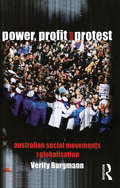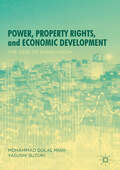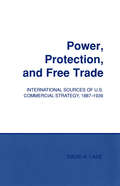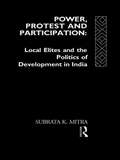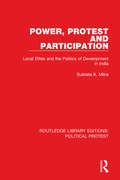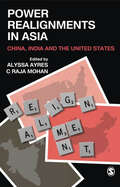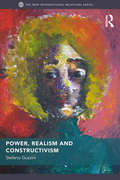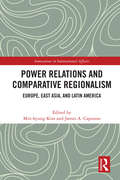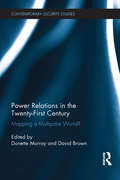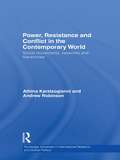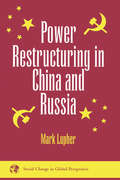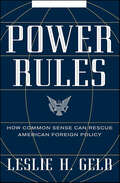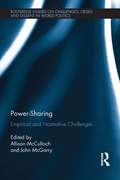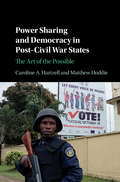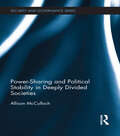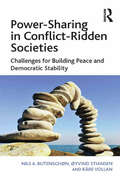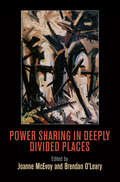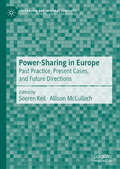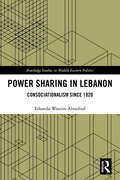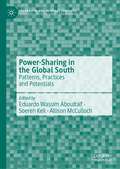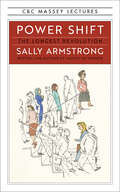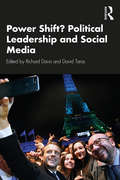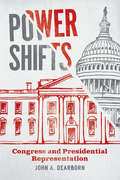- Table View
- List View
Power, Profit and Protest: Australian social movements and globalisation
by Verity Burgmann'a provocative must-read text for an engaged public, offering a distinctive Australian take on corporate globalism, and grounding this in a robust theory of social change that emphasises material power and interests, along with symbolic power and ideology'James Goodman, University of Technology SydneySocial movements transformed Western societies in the 1960s and 1970s: feminism, black rights, the peace movement and gay liberation all radically altered how we think and how we live. What has happened to social movements since then? Can demonstrations and other forms of social activism still make a difference in Australia?Verity Burgmann argues that corporate globalisation has threatened or transformed established social movements, and sparked powerful new forms of social protest. She examines the impact of globalisation and neo-liberal government policies on the feminist and indigenous rights movements, showing how they have been affected by the politics of backlash after decades of success. She explores the way in which the environment movement, too, has been affected by rising corporate political influence. She also analyses the emergence of anti-capitalist and anti-corporate activism and the profound challenges posed by this newest of social movements to the state, to society in general and to the labour movement in particular. These important factors in a changing political landscape. This book reflects on the significant changes which has taken place since Power and Protest was published in 1993.
Power, Property Rights, and Economic Development: The Case of Bangladesh
by Mohammad Dulal Miah Yasushi SuzukiThis book presents a critical reassessment of theories of property rights, in response to conflicts and competition between different groups, and the state. It does so by taking an institutional political perspective to analyse the structures of property rights, with a focus on a series of case studies from Bangladesh. In doing so, the book highlights the importance of property rights for economic growth, why developing countries often fail to design property rights conducive for economic development, and the strategies required for designing an efficient structure of rights. Since property rights falls within the domain of Law and Economics, the book ventures to explain legal issues from an economic perspective, resulting in empirical analysis that comprises both legal and non-legal cases.
Power, Protection, and Free Trade: International Sources of U.S. Commercial Strategy, 1887–1939 (Cornell Studies in Political Economy)
by David A. LakeWhy do nations so frequently abandon unrestricted international commerce in favor of trade protectionism? David A. Lake contends that the dominant explanation, interest group theory, does not adequately explain American trade strategy or address the contradictory elements of cooperation and conflict that shape the international economy. Power, Protection, and Free Trade offers an alternative, systemic approach to trade strategy that builds on the interaction between domestic and international factors. In this innovative book, Lake maintains that both protection and free trade are legitimate and effective instruments of national policy, the considered responses of nations to varying international structures.
Power, Protest and Participation: Local Elites and Development in India
by Subrata K. MitraThe attitudes of local elites - the hinge between Indian state and rural society - towards protest and participation in development. Illuminates arguments about the nature of the state as well as the development process.
Power, Protest and Participation: Local Elites and the Politics of Development in India (Routledge Library Editions: Political Protest #18)
by Subrata K. MitraThis book, first published in 1992, examines the attitudes of local elites – the hinge between Indian state and rural society – towards protest and participation in development, illuminating arguments about the nature of the state as well as the development process. It looks at the role of local elites in India both as the representatives of the state and of the rest of rural society, and explains their importance in the country’s development. The book deals with the elites’ contribution to the credibility of the state and examines the strategies through which they manipulate the allocation of resources and influence the pace and direction of social change. It contrasts the rural elites in two areas, one more economically advanced than the other. The elites in the first area were shown to be capable of combining institutional participation with radical protest, whilst in the other they tended to rely on state channels to achieve reform. The author concludes that despite the different settings, both groups were informed, active and responsive to political conditions. This contrasts with the conventional view that local elites of the dominant castes oppress the lower ones by obstructing reforms, for reasons of self-interest.
Power Realignments in Asia: China, India and the United States
by ALYSSA AYRES and C. RAJA MOHANChina′s emergence as a great power is transforming the world, affecting its security, economy and physical environment. Power Realignments in Asia: China, India and the United States explores the impact of China′s rise on relations among China, India and the United States. The topics covered in the collection span traditional security issues-political-military affairs and military modernization-to new challenges posed by rapid and deep economic integration, to global issues like energy security and environmental degradation accompanying rapid economic growth. Each of these issues affects the triangular dynamic among China, India and the United States. A special feature of this volume is that it is an informed assessment of an under-researched theme-China′s complex role in simultaneously promoting and inhibiting Indo-U.S. engagement. It examines the many shades of strategic ambiguity, reflected most recently in China′s response to the historic Indo-U.S. civil nuclear initiative. This work will be an important resource for all those interested in Asia′s security politics, the American response to the rise of China and India and the changing dynamic of Asian balance of power.
Power, Realism and Constructivism (New International Relations)
by Stefano GuzziniFramed by a new and substantial introductory chapter, this book collects Stefano Guzzini’s reference articles and some less well-known publications on power, realism and constructivism. By analysing theories and their assumptions, but also theorists following their intellectual paths, his analysis explores the diversity of different schools, and moves beyond simple definitions to explore their intrinsic tensions and fallacies. Guzzini’s approach to the analysis of power – within and outside International Relations – provides the common theme of the book through which the theoretical state of the art in IR is reassessed. A novel analysis of power and the potential limits of realism and constructivism in International Relations, Power, Realism and Constructivism will be of interest to students and scholars of international relations, international political economy, social and political theory, and the study of power.
Power Relations and Comparative Regionalism: Europe, East Asia and Latin America (Innovations in International Affairs)
by Min-Hyung KimThree trends have dominated the political economy of integration during the last two decades: globalization, economic nationalism, and regionalization. This book explores comparative regional integration, focusing on both intra regional integration and relations among regions in the context of power.The most common focus of integration studies has been on the logic of cooperation, but there is another logic of integration: power. The relevance of power today is represented by the relations within the Eurozone, especially between creditors and debtors. By the same line of reasoning, integration in Asia cannot ignore the respective roles of China, Japan, and Korea, nor the unresolved disputes about Taiwan, Hong Kong, and the islands in the South China Sea. This edited volume addresses the role of power in regional integration in three contexts: (1) the role of hegemonic external actors (the US and China) in regional integration; (2) the role of core states within regions (Germany, China , Japan, and Brazil); and (3) the role of noncore states- smaller and middle range powers (Italy and Greece in Europe; South Korea and Malaysia in Asia; and Argentina, Colombia, Uruguay, and Paraguay in Latin America).This book will benefit students and scholars of international relations and comparative political economy, especially those with an interest in integration studies and comparative regionalism.
Power Relations in the Twenty-First Century: Mapping a Multipolar World? (Contemporary Security Studies)
by Donette Murray David BrownThis volume critiques contemporary power trends by examining key bilateral dynamics between five putative ‘poles’ of the multipolar order in the twenty-first century. Written by emerging scholars and established academics, this work provides a timely and authoritative analysis of one of the most controversial and compelling security debates of the twenty-first century. Adopting a detailed case study approach, the volume examines contemporary great power relations between the US, China, Russia, India and the EU. Each chapter explores the essential nature and characteristics of individual inter-state relationships in order to explicate and appraise the empirical evidence for a putative multipolar order. The volume aims to deepen understanding of power trends and critically assess the individual inter-dynamics at play. In doing so, it critiques the various models offered, such as the hub and spoke model (with the US remaining as the primary actor) and Zakaria’s ‘networked’ model, as part of a purported ‘post-American world’. The work places each of the individual relationships into a wider strategic and political context, in relation to the continued international turbulence and change that has seemed even more prominent in recent times, taking into account the twin challenges of Brexit and the presidency of Donald Trump. It concludes by returning the focus to the central questions of if, how and when a post-American, multipolar world could develop. This volume will be of much interest to students of global security, foreign policy, and IR in general.
Power, Resistance and Conflict in the Contemporary World: Social movements, networks and hierarchies (Routledge Advances in International Relations and Global Politics)
by Athina Karatzogianni Andrew RobinsonThis book examines issues of organisation in resistance movements, discussing topics including the integration of the world system, the intersection of networks with discourses of identity, and the possibility of social transformation. Drawing on a number of theorists including Deleuze and Guattari, authors Athina Karatzogianni and Andrew Robinson seek to reinterpret World Systems Theory in order to engage with issues of power, resistance, and conflict in the contemporary world. Discussing contemporary scholarship in global politics, the authors consider new and developing concepts including: global cities, bifurcations, hegemonic transitions, the relationship between capitalism and the state, the position of East Asia, and active and reactive network movements. Their analysis includes a very rich pool of empirical examples covering more than fifty countries and thirty resistance groups. Power, Resistance and Conflict in the Contemporary World will be of interest to students and scholars looking for a comprehensive new theorization of the forces at work in global politics. The book provides a framework which crosses the boundaries between international relations, international political economy, comparative politics, conflict studies, social movement studies and critical theory, producing a study of a highly interdisciplinary scope.
Power Restructuring In China And Russia (Social Change In Global Perspective Ser.)
by Mark LupherViewing the tumultuous events of the post-Mao era and the period of perestroika in the light of broader historical patterns, this book focuses on power restructuring - the ebb and flow of state power, the centralization and decentralization of political and economic power, and the three-way struggles between central rulers, various elites, and non-privileged groups that drive these processes. By comparing a series of pivotal episodes, the author aims to further readers' understanding of power-restructuring processes that will continue to unfold in China, Russia and the former Soviet republics.
Power Rules: How Common Sense Can Rescue American Foreign Policy
by Leslie H. Gelb“Fluent, well-timed, provocative. . . . Filled with gritty, shrewd, specific advice on foreign policy ends and means. . . . Gelb’s plea for greater strategic thinking is absolutely right and necessary.” — The New York Times Book Review “Few Americans know the inner world of American foreign policy—its feuds, follies, and fashions—as well as Leslie H. Gelb. . . . Power Rules builds on that lifetime of experience with power and is a witty and acerbic primer.” — The New York TimesPower Rules is the provocative account of how to think about and use America’s power in the world, from Pulitzer Prize winner Leslie H. Gelb, one of the nation’s leading foreign policy minds and practitioners.
Power-Sharing: Empirical and Normative Challenges (Routledge Studies on Challenges, Crises and Dissent in World Politics)
by Allison McCulloch and John McGarryPower-sharing is an important political strategy for managing protracted conflicts and it can also facilitate the democratic accommodation of difference. Despite these benefits, it has been much criticised, with claims that it is unable to produce peace and stability, is ineffective and inefficient, and obstructs other peacebuilding values, including gender equality. This edited collection aims to enhance our understanding of the utility of power-sharing in deeply divided places by subjecting power-sharing theory and practice to empirical and normative analysis and critique. Its overarching questions are: Do power-sharing arrangements enhance stability, peace and cooperation in divided societies? Do they do so in ways that promote effective governance? Do they do so in ways that promote justice, fairness and democracy? Utilising a broad range of global empirical case studies, it provides a space for dialogue between leading and emerging scholars on the normative questions surrounding power-sharing. Distinctively, it asks proponents of power-sharing to think critically about its weaknesses. This text will be of interest to students, scholars and practitioners of power-sharing, ethnic politics, democracy and democratization, peacebuilding, comparative constitutional design, and more broadly Comparative Politics, International Relations and Constitutional and Comparative Law.
Power Sharing and Democracy in Post-Civil War States: The Art of the Possible
by Caroline A. Hartzell Matthew HoddiePower Sharing and Democracy in Post-Civil War States examines the challenge of promoting democracy in the aftermath of civil war. Hartzell and Hoddie argue that minimalist democracy is the most realistic form of democracy to which states emerging from civil war violence can aspire. The adoption of power-sharing institutions within civil war settlements helps mitigate insecurity and facilitate democracy's emergence. Power sharing promotes 'democratization from above' by limiting the capacity of the state to engage in predatory behavior, and 'democratization from below' by empowering citizens to participate in politics. Drawing on cross-national and case study evidence, Hartzell and Hoddie find that post-civil war countries that adopt extensive power sharing are ultimately more successful in transitioning to minimalist democracy than countries that do not. Power Sharing and Democracy in Post-Civil War States presents a new and hopeful understanding of what democracy can look like and how it can be fostered.
Power-Sharing and Political Stability in Deeply Divided Societies (Security and Governance)
by Allison McCullochNearly all the peace accords signed in the last two decades have included power-sharing in one form or another. The notion of both majority and minority segments co-operating for the purposes of political stability has informed both international policy prescriptions for post-conflict zones and home-grown power-sharing pacts across the globe. This book examines the effect of power-sharing forms of governance in bringing about political stability amid deep divisions. It is the first major comparison of two power-sharing designs – consociationalism and centripetalism - and it assesses a number of cases central to the debate, including Nigeria, Sri Lanka, Fiji, Bosnia and Herzegovina, Burundi and Northern Ireland. Drawing on information from a variety of sources, such as political party manifestoes and websites, media coverage, think tank reports, and election results, the author reaches significant conclusions about power-sharing as an invaluable conflict-management device. This text will be of key interest to students and scholars of ethnic conflict management, power-sharing, ethnic politics, democracy and democratization, comparative constitutional design, comparative politics, intervention and peace-building.
Power-Sharing in Conflict-Ridden Societies: Challenges for Building Peace and Democratic Stability
by Nils A. Butenschøn Øyvind Stiansen Kåre VollanBased on a unique comparative study of Burundi, Rwanda, Ethiopia, Lebanon, Bosnia-Herzegovina, Nepal, Myanmar, the Philippines, and Fiji this book analyses the formal and informal arrangements defining the post-conflict political order in these countries and evaluates whether these systems strengthened or weakened the chances of establishing sustainable peace and lasting democracy. What can be learned from these cases? Each country has it unique history but they are faced with comparable challenges and dilemmas in building a democratic future. Which solutions seem to contribute to democratic stability and which do not? These questions are discussed in light of theoretical literature, case studies, and field interviews with the authors concluding that systems based on proportional representation offered the best prospects for including diverse and conflicting identities and building unified political systems. The book is of particular interest to students of democracy and peace-building; academics as well as decision-makers and practitioners in the field.
Power Sharing in Deeply Divided Places (National and Ethnic Conflict in the 21st Century)
by Joanne McEvoy Brendan O’LearyPower sharing may be broadly defined as any set of arrangements that prevents one political agency or collective from monopolizing power, whether temporarily or permanently. Ideally, such measures promote inclusiveness or at least the coexistence of divergent cultures within a state. In places deeply divided by national, ethnic, linguistic, or religious conflict, power sharing is the standard prescription for reconciling antagonistic groups, particularly where genocide, expulsion, or coerced assimilation threaten the lives and rights of minority peoples. In recent history, the success record of this measure is mixed.Power Sharing in Deeply Divided Places features fifteen analytical studies of power-sharing systems, past and present, as well as critical evaluations of the role of electoral systems and courts in their implementation. Interdisciplinary and international in formation and execution, the chapters encompass divided cities such as Belfast, Jerusalem, Kirkuk, and Sarajevo and divided places such as Belgium, Israel/Palestine, Northern Ireland, and South Africa, as well as the Holy Roman Empire, the Saffavid Empire, Aceh in Indonesia, and the European Union.Equally suitable for specialists, teachers, and students, Power Sharing in Deeply Divided Places considers the merits and defects of an array of variant systems and provides explanations of their emergence, maintenance, and failings; some essays offer lucid proposals targeted at particular places. While this volume does not presume that power sharing is a panacea for social reconciliation, it does suggest how it can help foster peace and democracy in conflict-torn countries.Contributors: Liam Anderson, Florian Bieber, Scott A. Bollens, Benjamin Braude, Ed Cairns, Randall Collins, Kris Deschouwer, Bernard Grofman, Colin Irwin, Samuel Issacharoff, Allison McCulloch, Joanne McEvoy, Brendan O'Leary, Philippe van Parijs, Alfred Stepan, Ronald Wintrobe.
Power-Sharing in Europe: Past Practice, Present Cases, and Future Directions (Federalism and Internal Conflicts)
by Soeren Keil Allison McCullochThis book evaluates the performance of consociational power-sharing arrangements in Europe. Under what conditions do consociational arrangements come in and out of being? How do consociational arrangements work in practice? The volume assesses how consociationalism is adopted, how it functions, and how it reforms or ends. Chapters cover early adopters of consociationalism, including both those which moved on to other institutional designs (the Netherlands, Austria) as well as those that continue to use consociational processes to manage their differences (Belgium, Switzerland, South Tyrol). Also analysed are ‘new wave’ cases where consociationalism was adopted after violent internal conflict (Bosnia and Herzegovina, Kosovo, North Macedonia, Northern Ireland) and cases of unresolved conflict where consociationalism may yet help mediate ongoing divisions (Cyprus, Spain). Soeren Keil is Reader in Politics and International Relations, Canterbury Christ Church University, United Kingdom. Allison McCulloch is Associate Professor in Political Science, Brandon University, Canada.
Power Sharing in Lebanon: Consociationalism Since 1820 (Routledge Studies in Middle Eastern Politics)
by Eduardo Wassim AboultaifThis book studies the origins and evolution of power sharing in Lebanon. The author has established a relationship between mobilization, ethnurgy (ethnic identification), memory and trauma, and how they impact power sharing provisions. The book starts with the events in the 1820s, when communities began to politicize their identities, and which led to the first major outbreak of civil violence between the Druze and the Maronites. Consequently, these troubled four decades in Lebanon led to the introduction of various forms of power-sharing arrangements to establish peace. The political systems introduced in Lebanon are: the Kaim-Makamiya (dual sub-governorship), a quasi-federal arrangement; the Mutassarifiya, the prototype of a power-sharing system; the post-independence political system of Lebanon which the book refers to as semi-consociation, due to the concentration of executive powers in the Presidential office; and finally, the full consociation of the Taif Republic. In each of these phases, there was a peculiar interaction between the non-structural elements that had a direct impact on power sharing; this led at times to instability, and at other times it brought down the system, as in 1840–1860 and 1975. Power Sharing in Lebanon is the first academic work that emphasizes the influence of the non-structural elements that hinder power sharing. This volume is now a key resource for students and academics interested in Lebanese Politics and the Middle East.
Power-Sharing in the Global South: Patterns, Practices and Potentials (Federalism and Internal Conflicts)
by Eduardo Wassim Aboultaif Soeren Keil Allison McCullochPower-sharing serves as a popular conflict resolution device at war’s end. Yet, the performance record of such arrangements is highly variable, sometimes leading to peace and stability and at other times to immobilism and institutional collapse. This book explores the adoption, function, and dissolution of power-sharing arrangements across the Global South, including case studies of Colombia, Ethiopia, Malaysia, and Iraq, and others to make sense of this mixed record. Authors identify a range of contextual factors as well as significant variations in the institutional rules and their meaning across the cases that help to explain divergent power-sharing outcomes. Emphasis throughout the chapters is placed on system adaptability for power-sharing success.
Power Shift: The Longest Revolution (CBC Massey Lectures)
by Sally ArmstrongBestselling author, journalist, and human rights activist Sally Armstrong argues that humankind requires the equal status of women and girls.The facts are indisputable. When women get even a bit of education, the whole of society improves. When they get a bit of healthcare, everyone lives longer. In many ways, it has never been a better time to be a woman: a fundamental shift has been occurring. Yet from Toronto to Timbuktu the promise of equality still eludes half the world’s population.In her 2019 CBC Massey Lectures, award-winning author, journalist, and human rights activist Sally Armstrong illustrates how the status of the female half of humanity is crucial to our collective surviving and thriving. Drawing on anthropology, social science, literature, politics, and economics, she examines the many beginnings of the role of women in society, and the evolutionary revisions over millennia in the realms of sex, religion, custom, culture, politics, and economics. What ultimately comes to light is that gender inequality comes at too high a cost to us all.
Power Shift? Political Leadership and Social Media: Case Studies in Political Communication
by Richard Davis David TarasPower Shift? Political Leadership and Social Media examines how political leaders have adapted to the challenges of social media, including Facebook, Instagram, Twitter, and memes, among other means of persuasion. Established political leaders now use social media to grab headlines, respond to opponents, fundraise, contact voters directly, and organize their election campaigns. Leaders of protest movements have used social media to organize and galvanize grassroots support and to popularize new narratives: narratives that challenge and sometimes overturn conventional thinking. Yet each social media platform provides different affordances and different attributes, and each is used differently by political leaders. In this book, leading international experts provide an unprecedented look at the role of social media in leadership today. Through a series of case studies dealing with topics ranging from Emmanuel Macron and Donald Trump's use of Twitter, to Justin Trudeau's use of selfies and Instagram, to how feminist leaders mobilize against stereotypes and injustices, the authors argue that many leaders have found additional avenues to communicate with the public and use power. This raises the question of whether this is causing a power shift in the relationship between leaders and followers. Together the chapters in this book suggest new rules of engagement that leaders ignore at their peril. The lack of systematic theoretically informed and empirically supported analyses makes Power Shift? Political Leadership and Social Media an indispensable read for students and scholars wishing to gain new understanding on what social media means for leadership.
Power Shifts: Congress and Presidential Representation (Chicago Studies in American Politics)
by John A. DearbornThat the president uniquely represents the national interest is a political truism, yet this idea has been transformational, shaping the efforts of Congress to remake the presidency and testing the adaptability of American constitutional government. The emergence of the modern presidency in the first half of the twentieth century transformed the American government. But surprisingly, presidents were not the primary driving force of this change—Congress was. Through a series of statutes, lawmakers endorsed presidential leadership in the legislative process and augmented the chief executive’s organizational capacities. But why did Congress grant presidents this power? In Power Shifts, John A. Dearborn shows that legislators acted on the idea that the president was the best representative of the national interest. Congress subordinated its own claims to stand as the nation’s primary representative institution and designed reforms that assumed the president was the superior steward of all the people. In the process, Congress recast the nation’s chief executive as its chief representative. As Dearborn demonstrates, the full extent to which Congress’s reforms rested on the idea of presidential representation was revealed when that notion’s validity was thrown into doubt. In the 1970s, Congress sought to restore its place in a rebalanced system, but legislators also found that their earlier success at institutional reinvention constrained their efforts to reclaim authority. Chronicling the evolving relationship between the presidency and Congress across a range of policy areas, Power Shifts exposes a fundamental dilemma in an otherwise proud tradition of constitutional adaptation.
Power Shifts: Congress and Presidential Representation (Chicago Studies in American Politics)
by John A. DearbornThat the president uniquely represents the national interest is a political truism, yet this idea has been transformational, shaping the efforts of Congress to remake the presidency and testing the adaptability of American constitutional government. The emergence of the modern presidency in the first half of the twentieth century transformed the American government. But surprisingly, presidents were not the primary driving force of this change—Congress was. Through a series of statutes, lawmakers endorsed presidential leadership in the legislative process and augmented the chief executive’s organizational capacities. But why did Congress grant presidents this power? In Power Shifts, John A. Dearborn shows that legislators acted on the idea that the president was the best representative of the national interest. Congress subordinated its own claims to stand as the nation’s primary representative institution and designed reforms that assumed the president was the superior steward of all the people. In the process, Congress recast the nation’s chief executive as its chief representative. As Dearborn demonstrates, the full extent to which Congress’s reforms rested on the idea of presidential representation was revealed when that notion’s validity was thrown into doubt. In the 1970s, Congress sought to restore its place in a rebalanced system, but legislators also found that their earlier success at institutional reinvention constrained their efforts to reclaim authority. Chronicling the evolving relationship between the presidency and Congress across a range of policy areas, Power Shifts exposes a fundamental dilemma in an otherwise proud tradition of constitutional adaptation.
Power Shifts: Congress and Presidential Representation (Chicago Studies in American Politics)
by John A. DearbornThat the president uniquely represents the national interest is a political truism, yet this idea has been transformational, shaping the efforts of Congress to remake the presidency and testing the adaptability of American constitutional government. The emergence of the modern presidency in the first half of the twentieth century transformed the American government. But surprisingly, presidents were not the primary driving force of this change—Congress was. Through a series of statutes, lawmakers endorsed presidential leadership in the legislative process and augmented the chief executive’s organizational capacities. But why did Congress grant presidents this power? In Power Shifts, John A. Dearborn shows that legislators acted on the idea that the president was the best representative of the national interest. Congress subordinated its own claims to stand as the nation’s primary representative institution and designed reforms that assumed the president was the superior steward of all the people. In the process, Congress recast the nation’s chief executive as its chief representative. As Dearborn demonstrates, the full extent to which Congress’s reforms rested on the idea of presidential representation was revealed when that notion’s validity was thrown into doubt. In the 1970s, Congress sought to restore its place in a rebalanced system, but legislators also found that their earlier success at institutional reinvention constrained their efforts to reclaim authority. Chronicling the evolving relationship between the presidency and Congress across a range of policy areas, Power Shifts exposes a fundamental dilemma in an otherwise proud tradition of constitutional adaptation.
